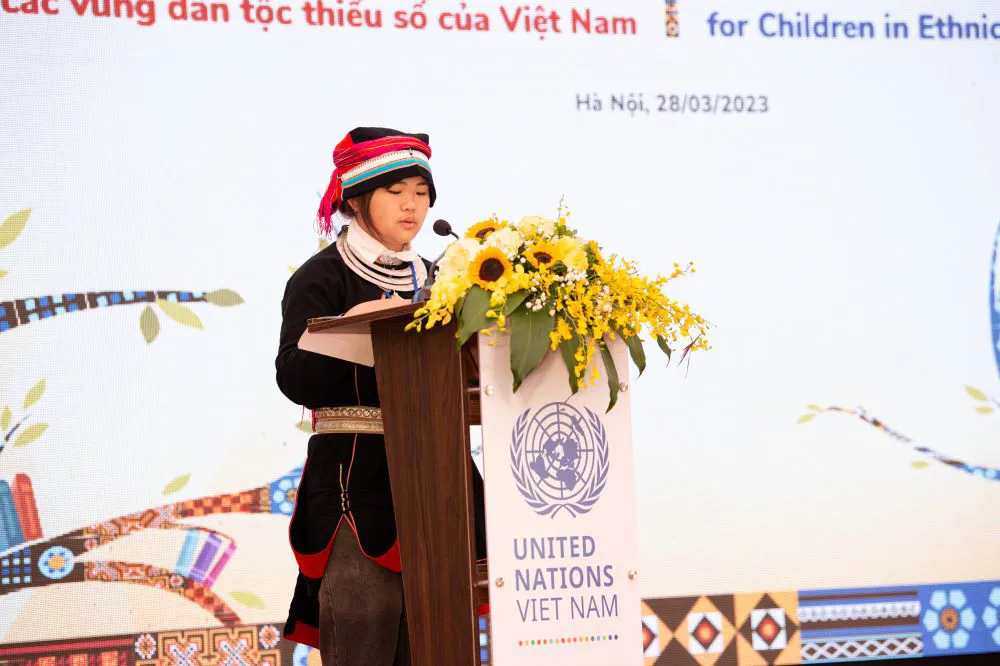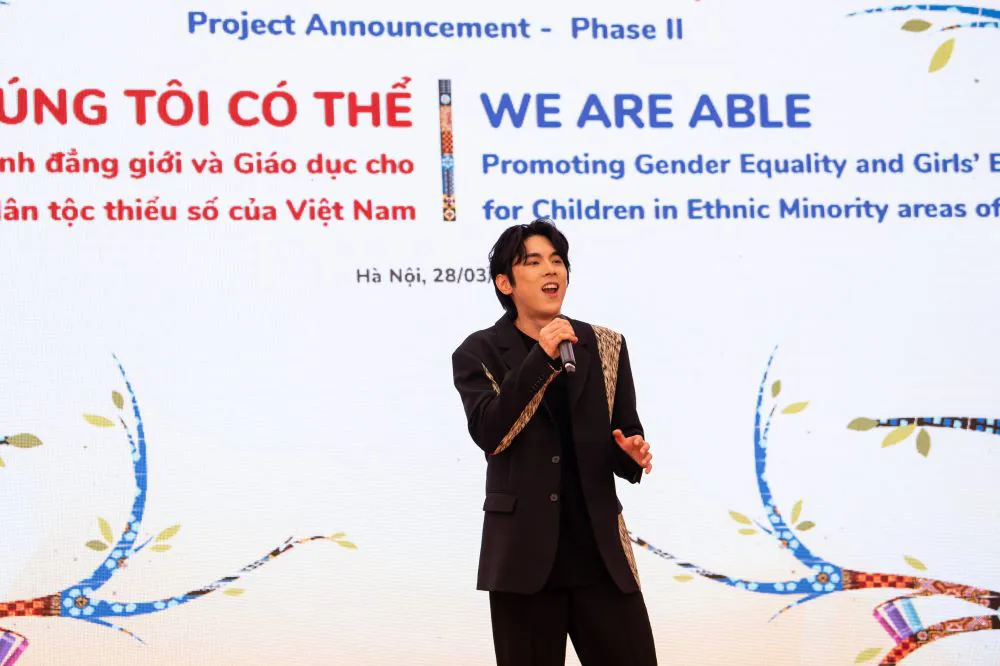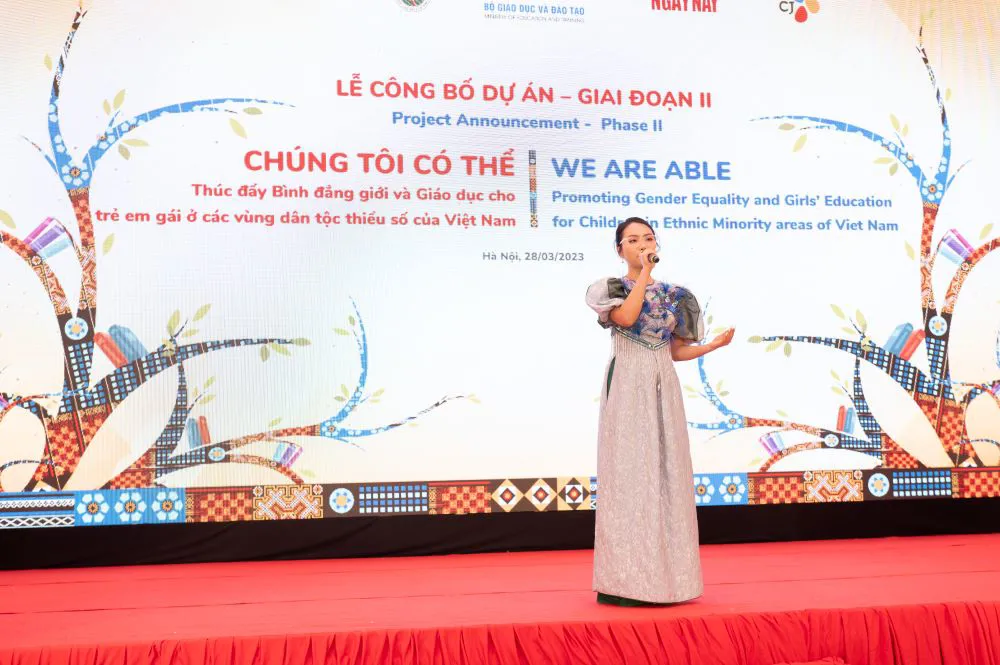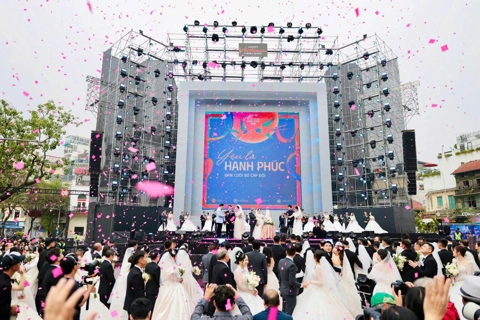UNESCO, int’l partners join hands to promote gender equality in Vietnam
The years-long projects help address stereotypes and other cultural barriers and encourage students of ethnic minorities to increase access and retention in schools.
“Achieving Better Living and Education” – acronym “ABLE” – emphasizes trust in the ability of ethnic minority children, especially girls, to overcome challenges.
| UNESCO Representative to Vietnam Christian Manhart said at the launch of Phase II held in Hanoi on Mar 28. Photos: UNESCO |
Education can be a true source of empowerment when it addresses the gender-based barriers, stigma, and discrimination that hold learners back from fulfilling their right to education and future life, work, and leadership opportunities, said Justine Sass, Chief of the Section of Education for Inclusion and Gender Equality of UNESCO Headquarters in Paris.
“We must harness education’s power to unlock the potential of learners in all of their diversity and transform educational institutions to achieve just, equal, and inclusive societies,” she shared.
The message was delivered at the launch of Phase II of the project “We are ABLE – Promoting Gender Equality and Girls’ Education for Children in Ethnic Minority areas of Vietnam,” organized by the UNESCO Office in Vietnam, in collaboration with the Ministry of Education and Training (MOET), the Ho Chi Minh Communist Youth Union (YU) and CJ Group, with representatives from the Committee for Ethnic Minority Affairs (CEMA) and the five project provinces.
In Vietnam, ethnic minorities are often disadvantaged compared to the majority of the population due to stereotypes and other cultural barriers. Despite considerable progress in universalizing basic education, ethnic minority children, especially girls, are more likely than other children to drop out. UNESCO’s “We are ABLE” project was launched to address this issue.
| A student benefiting from the project speaks at the launch of Phase II. |
Benefits of the project
Phase I of the project “We are ABLE” was jointly implemented from 2019-2022 by UNESCO, MOET, and CEMA, funded by the UNESCO Malala Fund for Girls' Right to Education with financial and technical support from CJ Group.
It targeted 12 districts in three provinces: Ha Giang, Ninh Thuan, and Soc Trang. The project increased ethnic minority girls’ access and retention in schools and ensured better employment opportunities for ethnic minority women.
Phase I of the project reached 16,296 students (including 8,021 girls). Across the 24 project schools, among ethnic minority learners, enrolment rates increased from 62% to 67%, drop-out rates dropped from 3.8% to 2.9%, and transition rates to upper-secondary rose from 69.7% to 76.7%.
In addition, 2,136 teachers and educational administrators were trained in gender-responsive school counseling, and thousands more will be reached through the national roll-out of the online course. Meanwhile, 120 ethnic minority women and youth were empowered with entrepreneurship training and continue to be supported through the Commune’s Women’s Union.
“The project helped us dare to share our dreams with our parents, teachers, and society. It was also a great motivation for us to keep trying and going to school,” shared Phan T.T., a student from Minh Tan secondary school, Ha Giang province.
“In recent years, thanks to the “We are ABLE” project, our school has attracted children to go to school and no child had to drop out from school to get married, which is an achievement for the school. We now also have career orientation for students through site visits at communities,” said Nguyen Van Thai, Vice Principal, Minh Tan secondary school, Ha Giang province.
| South Korean singer Isaac Hong performs at the launching ceremony. |
Inspiring moves
Phase II of the “We are ABLE” project will be rolled out in Cao Bang, Kon Tum, and Ninh Thuan provinces, aiming to empower ethnic minority youth, especially girls and young women, in boarding secondary schools and neighboring communities to overcome stereotypes and to voice and act on their dreams, hopes, and aspirations in education.
Phase II will build skills and platforms and create an enabling environment for student-led communication and advocacy and strengthen Government commitment to education for ethnic minority children and youth, especially girls.
MOET will continue to be a key partner to implement the project with UNESCO while YU, a new partner, will support student-led communication and advocacy and promote girls’ education through community outreach, and provincial and national fora.
“The project is expected to contribute to the Vietnamese Government’s new 10-year Education Development Strategic Plan, the Strategy for Ethnic Minority Development, and the national commitment to the achievement of the Sustainable Development Goals, especially Goal 4 on Education and Goal 5 on gender equality,” shared UNESCO Representative to Vietnam, Christian Manhart.
CJ Group remains the main donor for Phase II. Hee Kyung Jo Min, Executive Vice President and Head of Corporate Social Responsibility of CJ CheilJedang, said the first project was successful despite the Covid-19 situation because not only students but also teachers, parents, communities, and the Vietnamese Ministry of Education and Training participated passionately.
She noted that “We will also do our best to help more children be educated without discrimination and grow into talents who will lead Vietnam's future based on CJ's sharing philosophy.”
Phase I of the project ‘We are ABLE - Promoting Gender Equality and Girls’ Education for Children in Ethnic Minority areas of Vietnam” was designed with two pillars.
Pillar 1 addressed the issue of out-of-school children and school dropouts, especially ethnic minority girls, by (a) raising awareness of the importance of education, particularly for girls, among communities; (b) providing training on school counseling for lower secondary school teachers and education administrators; (c) supporting lower secondary school teachers to deliver school counseling work to lower secondary school students; and (e) organizing dialogues and meetings with parents, family members, and students.
Pillar 2 addressed the issue of limited employment opportunities for ethnic minority girls and women, by providing (a) improved career orientation programs for lower secondary school students, especially ethnic minority girls; and (b) training courses for community members, particularly women, to enhance knowledge and skills for income generation and employment.
| Vietnamese singer Phuong My Chi at the event. |
At the launch of Phase II, two famous Vietnamese and South Korean singers performed to inspire students and promote the project. South Korean singer Isaac Hong won 4th in the Yoo-Jae-Ha music competition, Korea’s only popular music competition designed to discover talented young singer-songwriters. Since his debut, he has built his music repertoire, releasing albums steadily, winning awards, and performing on different platforms. Isaac has proved his ability as an artist to the public and as a musician. He is making his own discography with heart.
Meanwhile, Vietnamese singer Phuong My Chi, 20, won many awards: runner-up of “The Voice Kids” (2013), “Best new artist” of Zing Music Awards (2013), and “Best song” of VTV Music Awards (2015). She has released three studio albums along with one extended album and achieved remarkable success. Currently, Phuong My Chi is considered the "golden voice in the folk song and bolero village" of Vietnam. She has 2,900,000 followers on Facebook, 55 million likes on TikTok, and 385,000 subscribers on YouTube.















